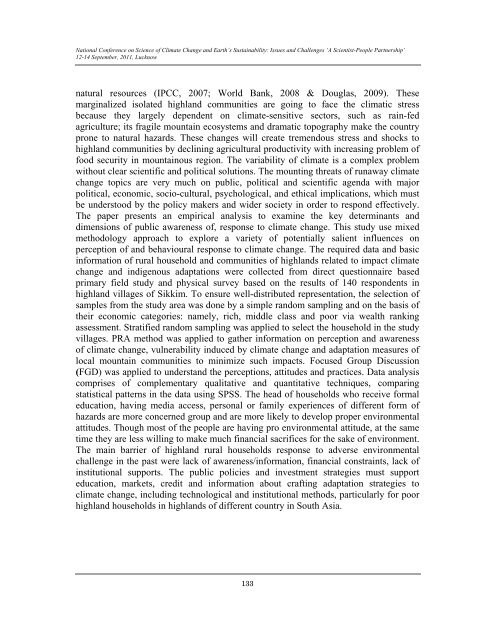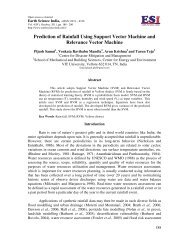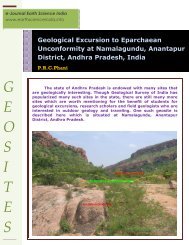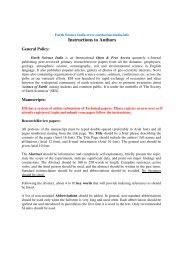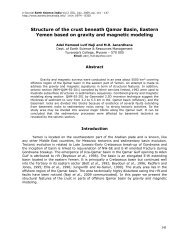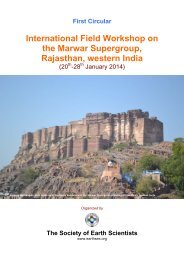12-14 September, 2011, Lucknow - Earth Science India
12-14 September, 2011, Lucknow - Earth Science India
12-14 September, 2011, Lucknow - Earth Science India
You also want an ePaper? Increase the reach of your titles
YUMPU automatically turns print PDFs into web optimized ePapers that Google loves.
National Conference on <strong>Science</strong> of Climate Change and <strong>Earth</strong>’s Sustainability: Issues and Challenges ‘A Scientist-People Partnership’<br />
<strong>12</strong>-<strong>14</strong> <strong>September</strong>, <strong>2011</strong>, <strong>Lucknow</strong><br />
natural resources (IPCC, 2007; World Bank, 2008 & Douglas, 2009). These<br />
marginalized isolated highland communities are going to face the climatic stress<br />
because they largely dependent on climate-sensitive sectors, such as rain-fed<br />
agriculture; its fragile mountain ecosystems and dramatic topography make the country<br />
prone to natural hazards. These changes will create tremendous stress and shocks to<br />
highland communities by declining agricultural productivity with increasing problem of<br />
food security in mountainous region. The variability of climate is a complex problem<br />
without clear scientific and political solutions. The mounting threats of runaway climate<br />
change topics are very much on public, political and scientific agenda with major<br />
political, economic, socio-cultural, psychological, and ethical implications, which must<br />
be understood by the policy makers and wider society in order to respond effectively.<br />
The paper presents an empirical analysis to examine the key determinants and<br />
dimensions of public awareness of, response to climate change. This study use mixed<br />
methodology approach to explore a variety of potentially salient influences on<br />
perception of and behavioural response to climate change. The required data and basic<br />
information of rural household and communities of highlands related to impact climate<br />
change and indigenous adaptations were collected from direct questionnaire based<br />
primary field study and physical survey based on the results of <strong>14</strong>0 respondents in<br />
highland villages of Sikkim. To ensure well-distributed representation, the selection of<br />
samples from the study area was done by a simple random sampling and on the basis of<br />
their economic categories: namely, rich, middle class and poor via wealth ranking<br />
assessment. Stratified random sampling was applied to select the household in the study<br />
villages. PRA method was applied to gather information on perception and awareness<br />
of climate change, vulnerability induced by climate change and adaptation measures of<br />
local mountain communities to minimize such impacts. Focused Group Discussion<br />
(FGD) was applied to understand the perceptions, attitudes and practices. Data analysis<br />
comprises of complementary qualitative and quantitative techniques, comparing<br />
statistical patterns in the data using SPSS. The head of households who receive formal<br />
education, having media access, personal or family experiences of different form of<br />
hazards are more concerned group and are more likely to develop proper environmental<br />
attitudes. Though most of the people are having pro environmental attitude, at the same<br />
time they are less willing to make much financial sacrifices for the sake of environment.<br />
The main barrier of highland rural households response to adverse environmental<br />
challenge in the past were lack of awareness/information, financial constraints, lack of<br />
institutional supports. The public policies and investment strategies must support<br />
education, markets, credit and information about crafting adaptation strategies to<br />
climate change, including technological and institutional methods, particularly for poor<br />
highland households in highlands of different country in South Asia.<br />
133


